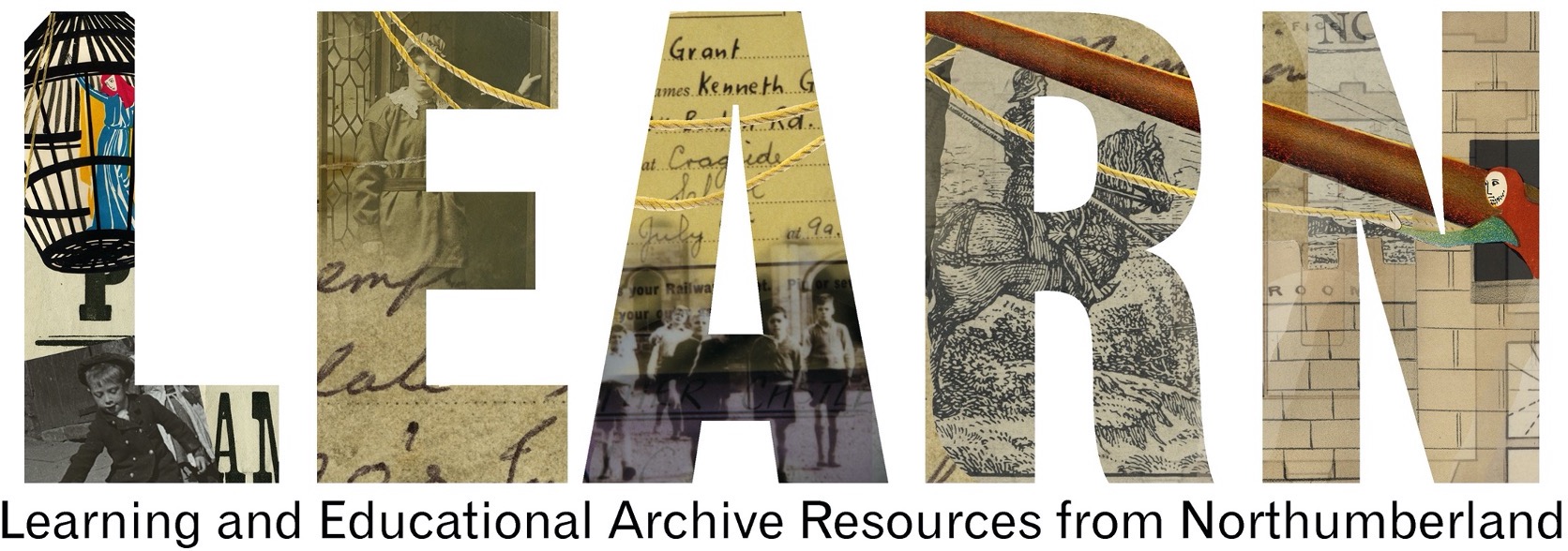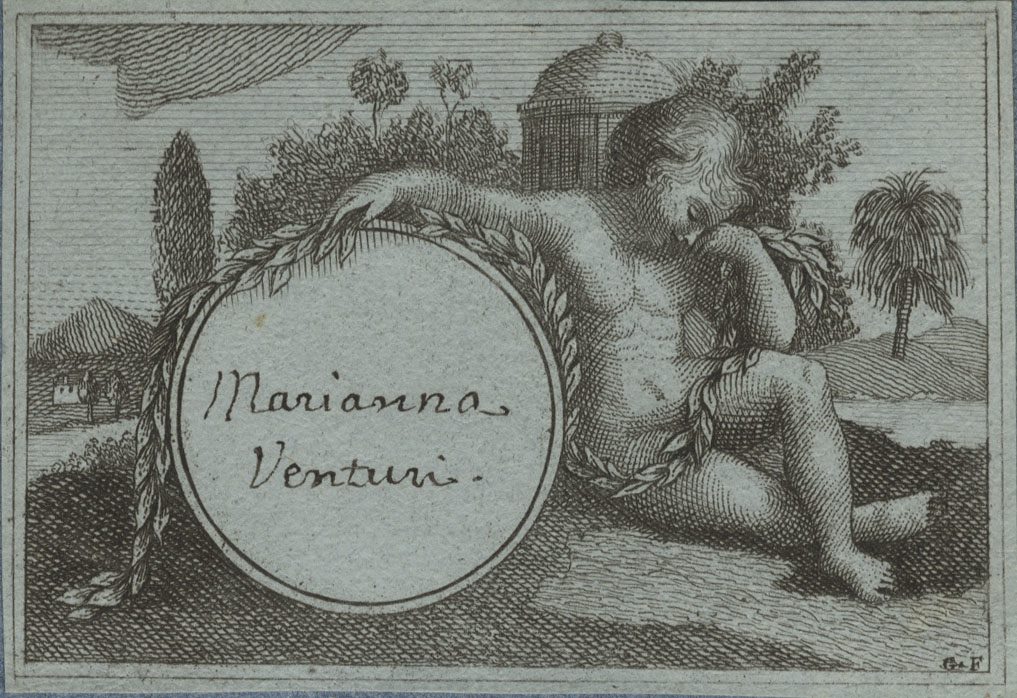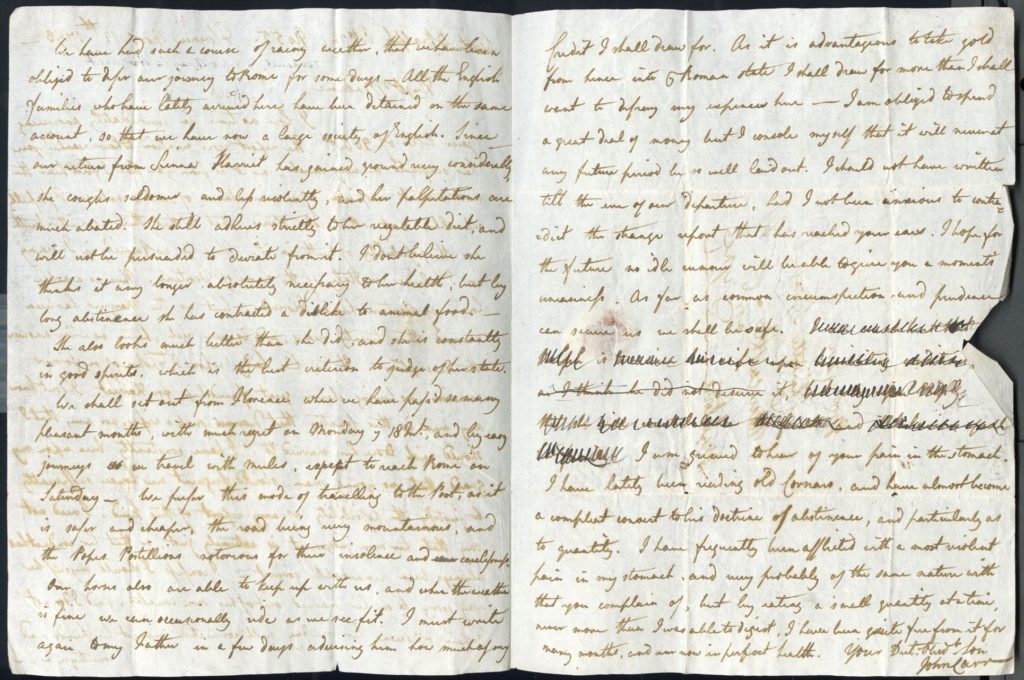Calling Card from Marianna Venturi, About 1793
Reference: ZCE F/4/1/3/25
Topics: The Grand Tour, Society
CALLING CARD FROM MARIANNA VENTURI
Paper calling or visiting cards, sometimes known as tickets, were in use from the 18th century. They were widely used by fashionable and wealthy members of society and were a form of status symbol.
Visitors would leave a card at the homes of friends and acquaintances to announce their arrival, to express appreciation for hospitality or sympathy for illness or other family sadness. If a visitor called and the host or hostess was not at home or was unavailable the card would be left to indicate that the visitor had called. The collection of calling cards was a method of demonstrating social contacts. Some of the cards collected by John and Harriet Carr on their Grand Tour have been preserved in a contemporary album. This is a useful way of establishing who John and Harriet met on their Tour. Social contact was an important part of the Grand Tour.
Well-connected tourists in Italy might expect to be introduced to court society. Prior to the unification of Italy which began in 1848, the country comprised a number of states, some ruled by Kings and others by Dukes. This system of governance was very different to the system that British tourists were familiar with and was observed and written about with interest. An introduction to court society might lead to invitations to dine at court and attend court events such as balls or hunting parties. Letters of introduction prepared by friends and acquaintances formed an important role in opening society doors to the Tourist. Ralph Carr’s business and personal interests would undoubtedly have opened doors to John and Harriet. The networking opportunities provided by the Grand Tour allowed friendships, and sometimes romantic relationships, to develop that would endure beyond the period of the Tour.
This printed calling card is one of those collected by John and Harriet Carr. The card has been bought as a blank with a space for the bearer to add their hand-written name, in this case, Marianna Venturi. The scene is in the classical style. Initials, presumably of the engraver, can be found in the bottom right-hand corner of the card. The Venturi family were an established noble family in Florence, and we know from correspondence in the Carr-Ellison collection that John and Harriet were in social contact with them. In a letter of 26 June 1793 John writes to his father ‘…We have been lately staying [two] or three days with the Marchesa Venturi at a delightful country house a few miles distant. She amongst many others has always had the utmost affection for Harriet, and she calls her her daughter. She has indeed a daughter a few years older married in France whom she says Harriet puts her in mind of, whose place she has the goodness to say is now amply supplied by a substitute scarce less dear to her than the original…’.
ZCE F/1/1/1/137 Letter from John Carr, Florence, Italy, to his mother Isabella Carr, 12th November 1793.
This letter makes direct reference to the Venturi family. John writes to dispel a rumour that has reached the ears of his parents back home at Dunston. There is a suggestion that Harriet is involved in a romantic relationship with a gentleman called Venteni. John is quick to dispel this writing that ‘…it is from you that I first hear the most distant suspicion of a circumstance of such a nature. It perfectly ressembles(sic) most other idle stories, that is, that there is neither truth nor the possibility of truth in it….’. He goes on to report that there is a noble family called Venturi in Florence but that the Marquis ‘…has been married these twenty years, and is very rich, he no wise answers the description . It is his Lady whom I have spoken of on former occasions as having shewn great friendship for Harriet. I dont(sic) know any man in this Country that deserves such a wife, nor any that I should wish to see her married to. I have constantly been upon my guard that no young man should frequent our house sufficiently to justify the possibility of any report of this kind. …’. The tone of the letter suggests that John was a loving and protective brother to Harriet. Not only is he concerned with Harriet’s reputation but makes reference to her health, reporting that her cough (thought to be tuberculosis) has improved ‘…and her palpitations are much abated’. He also reports that Harriet is following a vegetarian diet.
John Carr writes that his letter is an immediate response to a letter written by his mother on 20 October 1793. We therefore have an indication of the length of time taken to send/receive a letter to Italy at this time. It also gives an insight into how unofficial news reached a family back in England. We can surmise that news of the alleged romance had been transmitted to Mr and Mrs Carr via social gossip, perhaps from the family member of a friend or acquaintance, who has returned from the Grand Tour.
ADDITIONAL RESOURCES
ZCE F/1/1/1/137 Letter from John Carr, Florence, Italy, to his mother Isabella Carr, 12th November 1793.
This letter makes direct reference to the Venturi family. John writes to dispel a rumour that has reached the ears of his parents back home at Dunston. There is a suggestion that Harriet is involved in a romantic relationship with a gentleman called Venteni. John is quick to dispel this writing that ‘…it is from you that I first hear the most distant suspicion of a circumstance of such a nature. It perfectly ressembles(sic) most other idle stories, that is, that there is neither truth nor the possibility of truth in it….’. He goes on to report that there is a noble family called Venturi in Florence but that the Marquis ‘…has been married these twenty years, and is very rich, he no wise answers the description . It is his Lady whom I have spoken of on former occasions as having shewn great friendship for Harriet. I dont(sic) know any man in this Country that deserves such a wife, nor any that I should wish to see her married to. I have constantly been upon my guard that no young man should frequent our house sufficiently to justify the possibility of any report of this kind. …’. The tone of the letter suggests that John was a loving and protective brother to Harriet. Not only is he concerned with Harriet’s reputation but makes reference to her health, reporting that her cough (thought to be tuberculosis) has improved ‘…and her palpitations are much abated’. He also reports that Harriet is following a vegetarian diet.
John Carr writes that his letter is an immediate response to a letter written by his mother on 20 October 1793. We therefore have an indication of the length of time taken to send/receive a letter to Italy at this time. It also gives an insight into how unofficial news reached a family back in England. We can surmise that news of the alleged romance had been transmitted to Mr and Mrs Carr via social gossip, perhaps from the family member of a friend or acquaintance, who has returned from the Grand Tour.
ZCE F/1/1/1/137 Letter from John Carr, Florence, Italy, to his mother Isabella Carr, 12th November 1793.
(Wrote to Ralph Oct[obe]r 24) No 55 Florence Nov[embe]r 12th 1793
My D[ea]r Madame
I lose no time in immediately answering your letter of 20 Oct[obe]r. The report you mention to have reached you has surprised me very much, as it is from you that I first hear the most distant suspicion of a circumstance of such a nature. It perfectly ressembles(sic) most other idle stories, that is, that there is neither truth nor the possibility of truth in it. There is no family in Tuscany nor I believe in Italy of the name of Venteni. There is a noble house of Venturi here in Florence, but as the Marquis has been married these twenty years, and is very rich, he no wise answers the description. It is his Lady whom I have spoken of on former occasions as having shewn great friendship for Harriet. I dont(sic) know any man in this Country that deserves such a wife, nor any that I should wish to see her married to. I have constantly been upon my guard that no young man should frequent our house sufficiently to justify the possibility of any report of this kind. I need not say that her own judgement is extremely just, or that her conduct has always been remarkably correct. I confess I should myself be very sorry to see her married out of her own country, and I do not despair of seeing her one day well connected amongst her friends and countrymen.
We have had such a course of rainy weather, that we have been obliged to defer our journey to Rome for some days. All the English families who have lately arrived here have been detained on the same account, so that we have now a large society of English. Since our return from Sienna(sic) Harriet has gained ground very considerably, she coughs seldomer and less violently, and her palpitations are much abated. She still adheres strictly to her vegetable diet, and will not be persuaded to deviate from it. I dont(sic) believe she thinks it any longer absolutely necessary to her health, but by long abstinence she has contracted a dislike to animal food.
She also looks much better than she did, and she is constantly in good spirits, which is the best criterion to judge of her state.
We shall set out from Florence where we have pass’d so many pleasant months, with much regret on Monday the 18 In[stan]t, and by easy journeys as we travel with Mules, expect to reach Rome on Saturday. We prefer this mode of travelling to the Post, as it is safer and cheaper, the road being very mountainous, and the Popes(sic) Postillions notorious for their insolence and carelessness. Our horses also are able to keep up with us, and when the weather is fine we can occasionally ride as we see fit. I must write again to my Father in a few days advising him how much of my Credit I shall draw for. As it is advantageous to take gold from hence into the Roman state I shall draw for more than I shall want to defray my expences(sic) here. I am obliged to spend a great deal of money but I console myself that it will never at any future period be so well laid out. I should not have written till the eve of our departure, had I not been anxious to contradict the strange report that has reached your ears. I hope for the future no idle rumour will be able to give you a moment’s uneasiness. As far as common circumspection and prudence can secure us we shall be safe.
[The following is crossed through probably at a later date by an unknown hand]
I am much hurt that Ralph is to receive his wife upon humiliating conditions as I think he did not deserve it, but rely upon Miss G. that she will counterbalance the faults and all[…..] of all her family.
I am grieved to hear of your pain in the stomach. I have lately been reading old Cornaro, and have been almost become a compleat convert to his doctrine of abstinence, and particularly as to quantity. I have frequently been afflicted with a most violent pain in my stomach, and very probably of the same nature with that you complain of, but by eating a small quantity at a time, never more than I was able to digest, I have been quite free from it for many months, and am now in perfect health. Your Dut[iful] Obed[ien]t Son John Carr
The Grand Tour and the Carr Family
Art Treasures in the North: Northern Families on the Grand Tour by Anne French (Unicorn Publishing Group, 2000)
John and Harriet Carr: A Brother and Sister from The North-East on The Grand Tour by Bill Purdue (Northern History, vol. 30, no. 1, 1994)
The British Abroad: The Grand Tour in the Eighteenth Century by Jeremy Black (The History Press, 1992)
Italy and the Grand Tour by Jeremy Black (Yale University Press, 2010)
Ladies of the Grand Tour by Brian Dolan (Flamingo, 2010)




